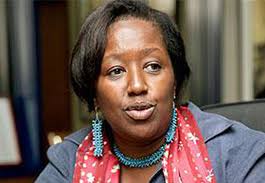The current Vice-Chancelor of the University of Global Health Equity (UGHE) in Rwanda, and Former Rwandan Minister of Health, Dr Agnes Binagwaho has been appointed to the board of trustees of The Rockefeller Foundation, an official source revealed Saturday in Kigali.
According to a statement by the foundation, Dr Binagwaho was appointed on the board alongside Ndidi Okonkwo Nwuneli of Nigeria, founder of LEAP Africa and co-founder of Sahel Consulting.
Commenting on the appointment, board chairman, Richard D. Parsons, said that both women were recognized for their dedication to leadership.
“It is a pleasure to welcome Agnes and Ndidi to our board of trustees. As the foundation works to lift up the most vulnerable people in communities around the world, their deep global development expertise and longstanding commitment to improving lives will be invaluable to the organization,” he said.
“Agnes and Ndidi have demonstrated and been recognized for their dedication and leadership in global health and agriculture, respectively, which are core areas of the foundation’s work. I know I
speak for the entire board in saying we are thrilled to welcome them to The Rockefeller Foundation.”
President of The Rockefeller Foundation, Rajiv J. Shah, said: “I feel extremely fortunate to have Binagwaho and Ndidi join our Board of Trustees. Binagwaho has helped change the national health landscape as a member of the government of Rwanda and is an important leader in the
field of global health.
With more than 23 years of experience in international development, Nwuneli was recognized as a young global leader by the World Economic Forum, received a national honour (Member of the Federal Republic) from the Nigerian government and has been listed as one of the 20 Youngest Power African Women by Forbes.
The Rockefeller Foundation’s work in Africa has focused on addressing critical issues surrounding poverty and economic instability on the continent.
Over the years, the Foundation’s support has led to the development of vaccines for deadly diseases, increased the accessibility of higher education, established more resilient and effective health systems, and supported smallholder farmers through more resilient farming
practices.
CU/APA
CU/abj/APA


